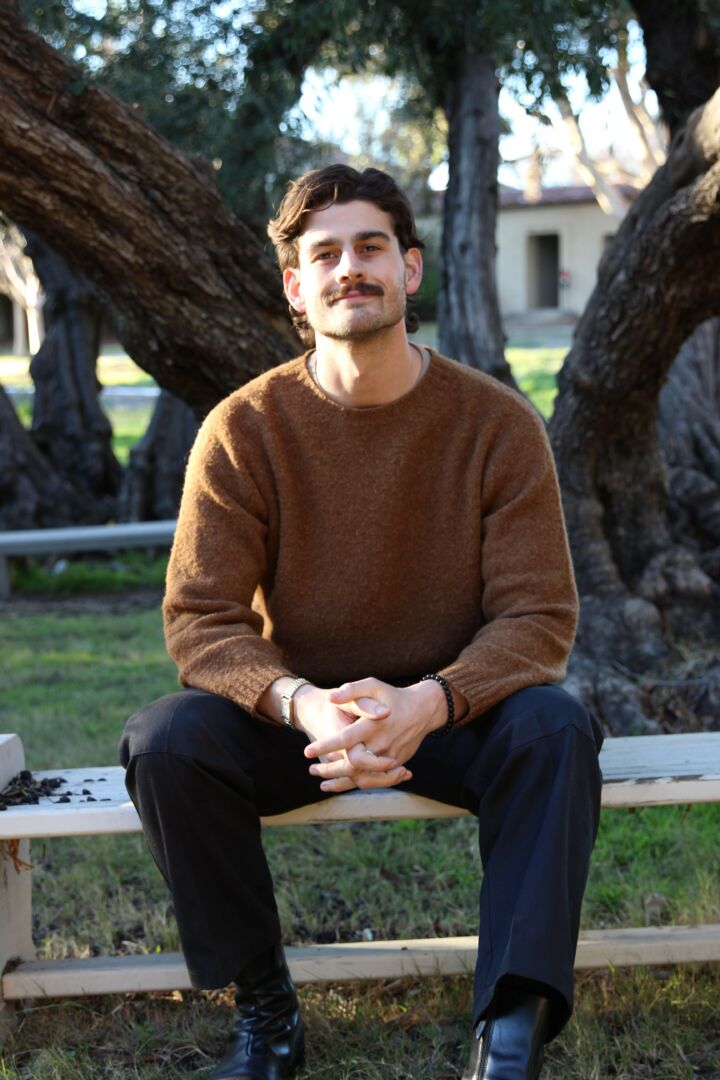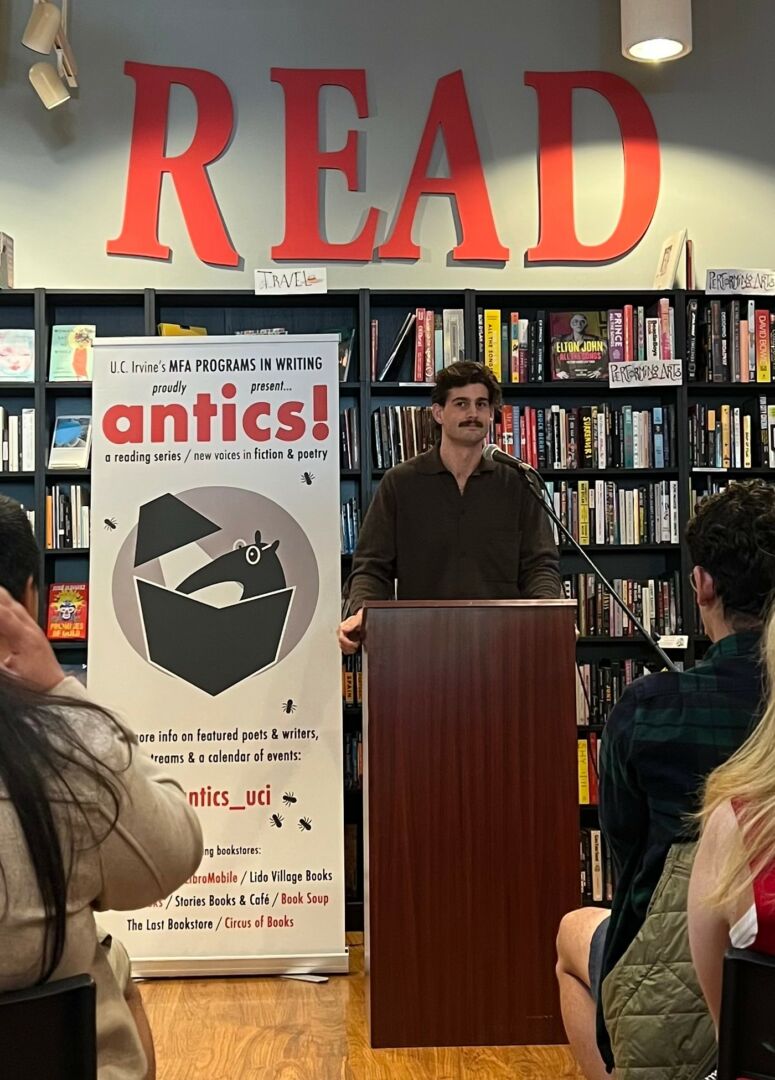Meet Nick Martino | Poet and teacher


We had the good fortune of connecting with Nick Martino and we’ve shared our conversation below.
Hi Nick, why did you decide to pursue a creative path?
Pursuing a career in poetry isn’t the result of one specific decision, but rather the accumulation of small moments over years and years. For me, it was always the path of least resistance: a kind of solitary joy I could embark upon on my own.
I began writing poetry in high school after my sophomore year English teacher had us write an alternative ending to the novel 1984. I was a shy, introverted child who loved reading books, but that assignment made me realize that a particular thrill of writing lay in the power of discovery and surprising myself. The blank page was a kind of expectant emptiness I could speak into without fear of judgement or shame. That fear would certainly come later, but in those early days I wrote with a kind of heady abandon a series of short stories (of which I can only remember one, written from the perspective of a white blood cell voyaging through the body) that allowed me to experience how exciting it could be to write without any plan in mind and see what the hell came out. This is the kernel of expectation and excitement from which I begin every poem. The minute I know what direction I’m writing in, the minute I plot the ending before I’ve arrived, is the minute the poem turns belly up. It becomes a chore, then, a kind of duty rather than a proper venue for surprise and excitement. I’m trying to say that I write because I prioritize joy whenever possible, and writing is (usually) a joyful act. If it weren’t, I wouldn’t do it.
Short stories turned into novels turned into poetry, and it was poetry that stuck. It’s in poetry I feel most able to pursue my own surprise, free of the expectations of plot and character. I wrote throughout high school and into college, reciting poems at open mic nights and publishing in school journals, and kept writing beyond graduation, spending long hours crafting and revising poems late into the night. Again, it was a kind of solitary joy that was mine alone, which made it feel all the more special to me. I didn’t yet have the writing community I have now, and it was difficult to write in a silo, but it was strangely thrilling too. And I felt myself getting better, but it wasn’t until I began teaching after graduation that I realized a career in writing was possible.
I saw it this way: an MFA would allow me to continue to my practice, giving myself the time, space, and proper support system to grow as a writer. There are MFA programs that offer full tuition remission while also allowing you to teach, which I prioritized, knowing that in poetry they are very, very few poets who can sustain themselves on publishing poetry alone. Instead, many teach alongside publication and are able to stitch together a career in that way. With this in mind I attended UC Irvine’s MFA program and graduated in 2023 after three years of incredible mentorship from poets Amy Gerstler, Doug Brown, Natalie Shapero, and Monica Youn. I submitted my thesis, a book-length collection of poems to a number of literary awards and publication prizes and was lucky enough to win the 2024 Alice James Editors’ Choice Award. My book, titled “Scrap Book”, will be published in June of 2026. I’m so tremendously lucky and overjoyed to be working with Alice James, a publisher whose books I’ve long read and cherished.
Is the moment the book was accepted the moment when this personal practice became a career? Or the moment I was accepted into grad school? I don’t know, maybe. I like to give myself more agency over the situation and think of it as the moment that I first wrote that weird short story about white blood cells. That answers the when, but not the why. In this case, the why is what it’s always been: because it brings me joy.

Let’s talk shop? Tell us more about your career, what can you share with our community?
My poetry is invested in examining the intersection of silence, family history, and incarceration. My forthcoming book “Scrap Book” is is interwoven with poems addressing nine Polaroid photos of my father in prison in 1989, four years before I was born.
This is a book that writes toward the idea of “development” as it applies to photography against the way that an understanding “develops” within us. How the understanding of my family’s history feels like a process of slow development, with details falling into place over the course of decades. I’ve invented a form for these Polaroid photographs that I’m proud of: 12-line, double-spaced, even-margined poems that I place within a rudimentary box and allow to unfold across pages. In this simple way they resemble Polaroid photographs made out of text. On the first page, I present a partially-erased version of the final, “completed” text. The second page presents more of the text emerging out of the erasure, and then the third (or sometimes fourth) page presents that final “completed” text in full. In this way, the final text “develops” out of blankness or silence as you flip the page, like a Polaroid would over time, or like an understanding of one’s particular family history changes over time. You can view animated versions of these poems published with the Los Angeles Review here:
In addition to these poems reckoning with archival family photos, I have a series of poems in “Scrap Book” that take scans of the journal my mother kept during my father’s incarceration (with her blessing, of course). In this journal she records the daily color of Lake Michigan alongside brief details of trips to the prison on select visitation days. I’ve written poems alongside and on top of this document as an attempt to get closer to it, to exist within its language and environment. This is wonderful, because it means that I have a few poems in the book that I’ve coauthored with my mom. They’re a strange hybrid of echo, call and response, and palimpsest, and I’m thrilled about how they bring my mom’s handwriting directly into the book itself.
These Polaroid poems and journal poems are the scrap of “Scrap Book”, a document that attempts to piece together a whole family history from fragments.
If you had a friend visiting you, what are some of the local spots you’d want to take them around to?
Yes! Fabulous, I love this.
First I pick them up at LAX and we grab burgers at In n’ Out and sit on Santa Monica beach. Jumping in the ocean is the most important part of any visit to LA, so we knock that off the bucket list next (and we’ll be back, too).
From there, it’s a whirl of bars, restaurants, bookstores, concert venues, parks. The first bar I bring anyone to is my neighborhood bar Capri Club. The staff is so welcoming, the vibes are excellent, and the drinks there are incredible. If my friend is feeling beer we just walk a block over to Walt’s, where the vibes are similarly excellent (and there’s pinball). Other bars in the area-ish (generally the east side of LA) I love are The Grant, Bar Henry, Cafe Triste, and Good Housekeeping.
LA is the most incredible city for food. My first stop is Sonoratown, an incredible Sonoran taco place in DTLA. I used to live a block away and would eat there several times a week. Their tacos are my favorite steak tacos in the city. For even more tacos, we stop at the stand outside Target on Eagle Rock Boulevard. The al pastor there is amazing.
This is getting long-winded, so I’ll just list other amazing restaurants I love in LA: Ototo, Salazar, Bub and Grandma’s, Dan Sung Sa, Saffy’s, Lasita, Dunsmoor, Queen Street Bar & Grill, and Loreto are on the top of my list.
I love LA bookstores. I’d bring my friend to Skylight first (for their incredible poetry selection), and maybe we’d catch a reading. We’d go to Chevalier’s, Stories, and The Last Bookstore, too.
We’d spend a lot of time on the beach, or hiking the canyons in Malibu. Huntington Gardens is amazing and well worth a visit, and a Dodger Game is always fun. Finally, I love bringing friends to shows at Checker Hall, and going dancing at Zebulon.

Shoutout is all about shouting out others who you feel deserve additional recognition and exposure. Who would you like to shoutout?
This is an overwhelming question because there are so many people I want to dedicate this shoutout to. The first that comes to mind is Brent Ameneyro, who recommended me for this interview series. Brent is an amazing poet and editor in LA. We met when I first published several poems with The Los Angeles Review, where Brent works as a poetry editor. From there we struck up a friendship, and I was lucky enough to be invited by him to read at the launch of his new, incredible book “A Face Out of Clay”. Brent is an example of the beautiful, supportive poetry community I feel very lucky to be a part of.
I already briefly mentioned them, but my poetry teachers at UCI were Amy Gerstler, Doug Brown, Natalie Shapero, and Monica Youn. I could write a novel for each detailing just how much they helped me develop as a writer and a person. It’s a tremendous privilege to attend an MFA like UCI’s because the small class size (six each year) allows for these strong relationships to develop. I learned so much from these poets and was introduced to so much new poetry. It felt like being shown new ways to see the world. I remain so grateful for their incredible kindness and generosity. “Scrap Book” wouldn’t exist without their patience, their scrutiny and care, their guidance and criticism and encouragement. It was only a three year degree, but it was life-changing. I know it’s trite to say, but it bears repeating: they changed my life for the better, and I will always be so grateful.
My family—my parents, my sister Mari, and my fiancee Sage—are my support system, and nothing would be possible without them. It’s only with their love and encouragement that I am where I am today. I still remember walking around the streets of Berkeley in 2018, where we lived at the time, and asking Sage if she thought I could possibly get into an MFA program. Her “yes” was a kind of permission to believe in myself, to take a chance and apply to something I didn’t see as possible for myself at the time. My parents and sister have similarly been my cheerleaders every step of the way. Any success I experience is their success too.
Website: https://www.nickmartinopoetry.com/
Instagram: @field_book
Twitter: @nickmartinopoet

Image Credits
Mimi Connelly (for the professional headshot)
